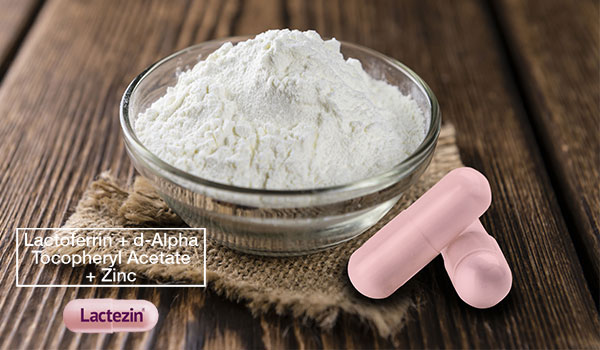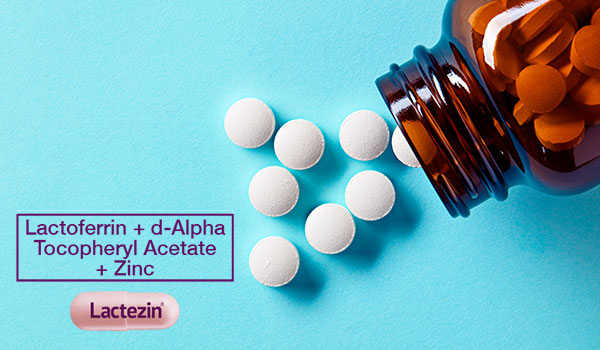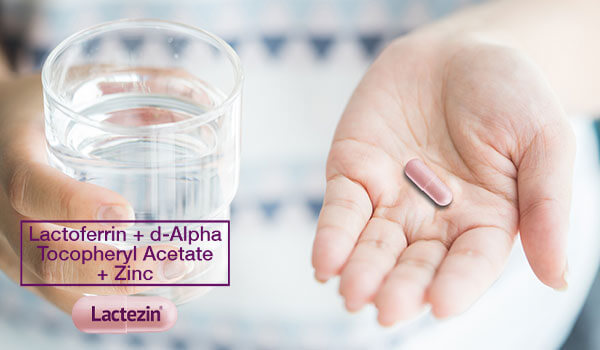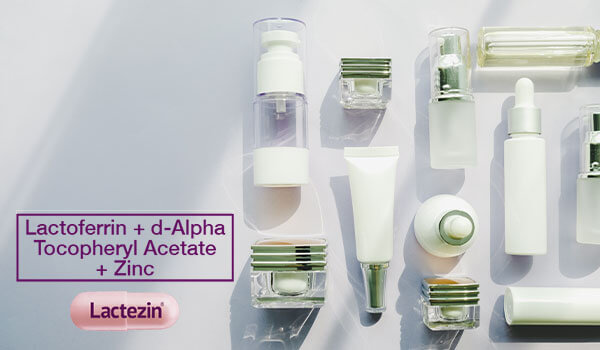Lactoferrin Benefits & Side Effects: What Happens When You Take It?

Lactoferrin is a protein that is slowly being recognized for its effects on acne. What you may not know is that it packs a handful more of benefits for your overall health. What are these benefits, and are there watch-outs to adding more of the protein to your daily nutrition? Read on to learn more about lactoferrin’s makeup, features and side effects.
Lactoferrin Benefits: What Lactoferrin Can Do for the Body
A protein found in cow’s milk, lactoferrin is in highest amounts (about 7x more) in colostrum or the first milk produced after a calf is born. It can also be found in human milk and in several other fluids such as saliva, tears, mucus, sweat and bile.
Lactoferrin’s main functions in the body are to bind with iron, and to transport iron to various parts of the body. It is touted as a solution or aid to a range of health conditions and processes including the following.
Guards Against Infections
Lactoferrin is an important component involved in immune responses. For better appreciation, it has to be noted that iron has a tricky role in the body’s immune system. While it triggers and activates the rapid increase of immune cells during immune response, iron also encourages bacterial and microbial growth. When a foreign body invades, your body (host) and pathogenic microorganisms (invading agents) fight over iron, and proteins such as lactoferrin keep iron safely away.
The iron-binding protein also exhibits destructive behavior against invading foreign bodies, as it destroys the walls around bacteria. To add, it is thought that lactoferrin in mother’s milk (especially in colostrum) helps protect breast-fed infants against infections.
A few studies suggest that lactoferrin may also inhibit hepatitis C infection. It helps increase the production of an immune-system protein that plays a key role in fighting off hepatitis C.
Promotes Stronger Bones
Although there is little research to it, it is suggested that lactoferrin has bone-building properties that could help with strengthening bones and preventing osteoporosis.
Laboratory tests have found that when combined with a mineral called hydroxyapatite, lactoferrin stimulates the production of osteoblasts or bone-forming cells. Studies have also been done on lactoferrin being able to minimize bone resorption in postmenopausal women.
Aids in Good Blood Health
Lactoferrin also has a role in keeping blood health up. By ensuring that iron is well-absorbed into the body, lactoferrin aids in the production of hemoglobins. These are substances in red blood cells that are responsible for supplying oxygen to vital organs and other parts of the body.
When you have good blood health, you can expect less fatigues, and more physical and mental energy.
Supports Skin Health
Lactoferrin is an antioxidant that comes with antibacterial and anti-inflammatory properties. It is through these features that lactoferrin keeps the skin functioning like a well-oiled machine.
- As an antioxidant, it fights off cell-damaging free radicals which means a lot to keeping skin healthy. It helps optimize skin cell renewal and keeps the skin’s protective barrier intact. From the outside, the skin would look healthy and supple, and wounds would heal faster.
- Lactoferrin’s antibacterial and anti-inflammatory properties help a great deal with keeping the skin clear of acne. These ensure that acne-causing bacteria and inflammation are minimized.
A study found that when combined with vitamin E and zinc, lactoferrin’s acne-clearing features are enhanced and able to reduce acne lesions, comedones and inflammatory lesions.
Are there Side Effects to Lactoferrin?
Thanks to its many benefits, lactoferrin is present in many supplements today. But remember that too much of a good thing can be bad. Very high doses of lactoferrin can cause unpleasant health effects such as diarrhea, chills, fatigue, loss of appetite and constipation. Due to the fact that lactoferrin can be sourced from cows, people worry about getting mad cow disease. Research debunks this myth however, as the disease is non-transferable to humans.
The acceptable intake level of sourced from dietary supplements ranges from 10 to 1200mg per day. To be safer, it’s best to consult a healthcare professional for a dosage that suits your age, health status and nutritional needs.
A Daily Supplement for Acne
Having troubles with acne? Let the skin-clearing benefits of lactoferrin help. Lactoferrin + d-Alpha Tocopheryl Acetate + Zinc (Lactezin) is an anti-acne drug that helps treat acne, as well as prevent breakouts with the combined good-for-the-skin trio of lactoferrin, vitamin E and zinc. Lactezin helps keep bacteria out, while regulating sebum production and improving skin cell renewal. Just take two capsules daily, one in the morning and one at night, and preferably with 8-14 hours apart. With proper and regular intake, results should be noticeable in as early as 2 weeks.
Read more features on skin care, skin types and managing different types of acne with expert tips and advice from Lactezin. Lactezin is available in drugstores nationwide, and online on Shopee and Lazada.
ASC Ref. No. U274P061422LS
SOURCES:
https://www.webmd.com/vitamins/ai/ingredientmono-49/lactoferrin
https://www.verywellhealth.com/the-benefits-of-lactoferrin-89471


